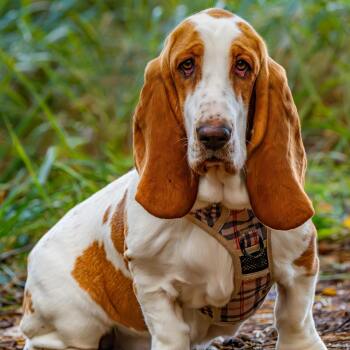Basset Hounds

The Long-Eared Lover with a Big Heart
If you're lucky enough to share your life with a Basset Hound, you already know that those soulful eyes and floppy ears come wrapped in pure devotion. Known for their easygoing nature and unmatched loyalty, Bassets are more than just pets—they’re family.
Why We’re Obsessed with Bassets
- Laid-Back Legends: Calm, gentle, and radiating good vibes—Bassets are the definition of chill.
- Total Sweethearts: Sensitive and affectionate, they adore being near their people.
- Kid & Pet Approved: Great with children and other animals, they’re social butterflies in slow-motion.
- Velcro Dogs: Don’t be surprised if your Basset follows you from room to room—they live for companionship.
- Low-Key Grooming Needs: That short coat is a breeze to maintain.
- Super Sniffers: Born hunters with noses that can track just about anything.
Little Quirks to Keep in Mind
- Snack Enthusiasts: They love food—portion control and exercise are a must.
- Training Is a Must: Early socialization and obedience lay the foundation for a happy, cooperative companion.
- Bark with a Bonus: They’re vocal and not shy about their opinions (read: expect some howling).
- Digging Fanatics: Gardeners, beware! They have a passion for paw-powered landscaping.
- The 3 S’s: Shedding, slobber, and the occasional room-clearing toot are part of the charm.
- Temperament Tip: Poor breeding can lead to overly hyper or reactive dogs—choose reputable breeders.
Still Worth It? Every Single Slobbery Second.
Basset Hounds come with their quirks, but they’re overflowing with love and personality. Whether they’re leaning on your leg or snoring on the couch, they make everyday life feel a little more relaxed—and a lot more loved.
A Little Basset Backstory
With roots in 16th-century France, Basset Hounds were bred as scent hounds for trailing rabbits and small game. Their name comes from the French word “bas” meaning “low”—perfectly fitting for their short legs and long bodies. Don’t let their slow shuffle fool you, though. Their noses are second only to the Bloodhound, and they follow scents with relentless focus.
Living Long and Loving It
Most Bassets enjoy around 12 wonderful years with their families. While generally healthy, there are a few conditions to watch for to help them live their best life.
Health Conditions to Know About
- Joint Health: Watch Puppy Growth— Puppies growing too fast can develop joint problems like osteochondritis dissecans (OCD). This occurs when cartilage doesn’t form properly. Avoid overfeeding and use a large-breed puppy formula to support safe development. Weigh-ins every few weeks help track growth.
- Bloat (GDV)— Their deep chests make them vulnerable to bloat, where the stomach twists and fills with gas. If your Basset looks bloated, retches without vomiting, or seems panicked, it’s a medical emergency. Preventive surgery is an option to reduce future risk.
- Eye Conditions— From glaucoma (redness, squinting) to cataracts and cherry eye, Bassets are prone to eye issues. Treatments range from drops to surgery—regular eye checks are essential.
- Neurologic Concerns: Wobbler Syndrome— If your Basset appears unsteady or weak in the legs, it may be a spinal issue. Imaging can confirm it, and treatment options include medication or surgery.
- Heart Health: Dilated Cardiomyopathy— This condition weakens the heart muscle and can cause fatigue, coughing, or breathing issues. Yearly heart screenings can catch it early.
- Addison’s Disease— This hormonal disorder affects the adrenal glands and can show up as vomiting, lethargy, or appetite loss. Blood tests are key to catching it early, and medication helps manage it long-term.
- Bleeding Disorders: Von Willebrand’s Disease— Before any surgery, your vet should test for clotting issues like von Willebrand’s, which is more common in Bassets.
- Back & Bone Concerns
- IVDD (Intervertebral Disc Disease)— That long spine can be prone to disc issues. Avoid too much jumping and be alert to signs of pain or posture changes.
- Hip, Elbow & Knee Dysplasia— These joint conditions can cause discomfort or limping. X-rays and early treatment help maintain mobility.
- Patellar Luxation— The kneecap slips out of place, leading to temporary lameness. Mild cases may resolve with meds, while severe ones need surgery.
- Panosteitis— Young Bassets may develop growing pains in the legs. It’s usually temporary but can be painful—your vet may recommend pain relief.
- Spinal Deformities— Conditions like hemivertebrae (misshaped spinal bones) may cause neurological issues. X-rays during puppyhood can help catch this early.
- Cancer Risks— Hemangiosarcoma, a fast-growing tumor, can occur in Bassets. Regular checkups, bloodwork, and ultrasounds improve chances of early detection.
- Stones & Stomach Trouble— If your pup strains to urinate or has blood in their pee, it could be bladder or kidney stones. Don’t wait—see a vet right away.
- Allergies & Skin Infections
- Food or Environmental Allergies— Itchy paws, ears, and bellies are common signs. There are many treatments, from diet changes to meds.
- Lip Fold Pyoderma— Those adorable droopy cheeks can trap moisture, leading to infection. Regular cleaning and sometimes antibiotics or surgery can help.
The Bottom Line: A Classic Companion
From their unmatched loyalty to their quirky habits, Basset Hounds are one-of-a-kind companions. They may come with a few snuffles and snores, but those soulful eyes and steady devotion make them a joy to love—and impossible to forget.
Ready to Learn More? We’re Here to Help!


